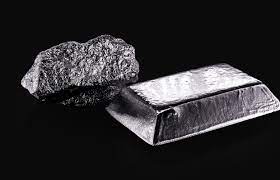Rhodium
Rhodium is a chemical element; it has symbol Rh and atomic number 45. It is a very rare, silvery-white, hard, corrosion-resistant transition metal. It is a noble metal and a member of the platinum group. It has only one naturally occurring isotope, which is 103Rh.
It reduces nitrogen oxides in exhaust gases. Rhodium is also used as catalysts in the chemical industry, for making nitric acid, acetic acid and hydrogenation reactions. It is used to coat optic fibres and optical mirrors, and for crucibles, thermocouple elements and headlight reflectors.

